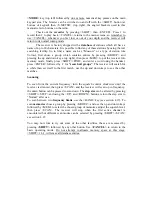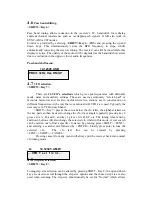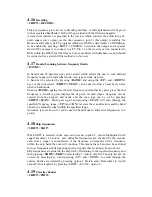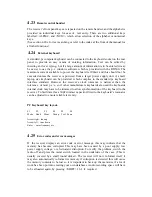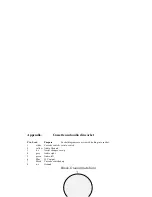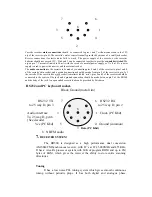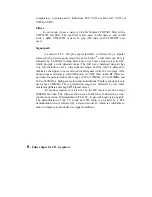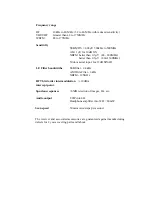
Creating groups with a memory for every channel step of a known band is a great way
of making use of the RD500’s massive memory and it allows seamless tuning with
identifying text at every turn of the dial!
Try to give a name to all the channels of, say, the 2 metre amateur band, e.g. “GB3HH
BUXTON Rptr”, or just “FM simplex”, if the channel is not allocated to a more
specific purpose. Tuning through these memories is more preferable to using band
mode because you will be constantly shown what each channel is allocated to and the
RD500 can recall record names as fast as you can tune. Band mode is more useful for
frequency searching, to find new signals .
b. Deleting records
Individual records can be deleted by selecting a memory and pressing
<SHIFT><CANCEL>.
In group mode pressing
<SHIFT> <CANCEL>
reveals a menu which allows all the
entries of a particular group to be deleted and options are provided to delete all tagged
memories or all untagged memories. There is also a
reset switch
located on the
underside of the receiver. Depressing this will erase all memories, the receiver will
then have to be set up to allow recording space if required by pressing <SHIFT>1,6,1
(see recording 4.14).
c. Searching records using text.
Any word or group of words or even part of a word can be searched for, and the search
method is not “case sensitive” so matches can be made when entries include capital
letters.
To search for a memory, press
<MEM>
or select a new group and press enter to go
the memory records. Then press
<SHIFT><TEXT> (FIND)
and enter your search
word.
Enter search text
_
The receiver will then ask if you want to search the memories in all the groups or just
the currently selected group. Enter 1 for current group and 2 for all groups.
Any record containing the search word will then appear in “review mode” and the
records can be viewed by pressing
the up and down keys.
Pressing
<ENTER>
takes you back to memory mode and it can be seen that all the
records containing the search word are now tagged with the letter t. Pressing
<MEM>
allows the tagged records to be reviewed again. Key 2. Clears the tags, Key 3. Shows
how many records are tagged and Key 4. allows the tagged records to be copied to a
new group. The group number can be changed by moving the cursor with the up and
down keys and entering numbers and letters via the keypad.
By copying records to a new group and then searching that specific group, the
user can start a search with a broad definition such as “broadcast” or “repeater” and
then narrow down the search with a city name or other attribute. Furthermore an initial
search can be made on the group names alone by pressing
<GROUP>
followed by
<SHIFT><TEXT>
. By making use of group names the total description of any
Summary of Contents for RD500
Page 1: ......
Page 27: ...This graph shows the response curves for the CW filter selections 9 SPECIFICATIONS...
Page 31: ......

